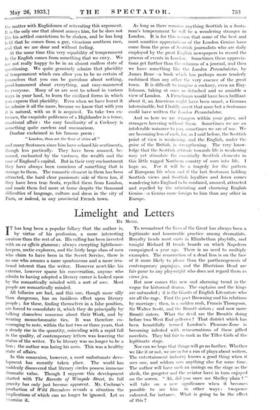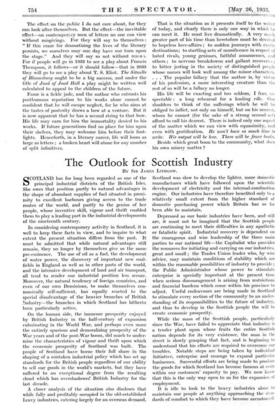Limelight and Letters
BY MOTIF.
IT has long been a popular fallacy that the author is, by virtue of his profession, a more interesting creature than the rest of us. His calling has been invested with an ex officio glamour ; always excepting lighthouse- keepers, arctic explorers, and the fairly large class of men who claim to have been in the Secret Service, there is no one who arouses a more spontaneous and a more irra- tional interest than the writer. However newt-like his exterior, however sparse his conversation, anyone who admits to having adopted a literary career is looked upon by the romantically minded with a sort of awe. Most people are romantically minded.
All fallacies are bad, and this one, though more silly than dangerous, has an insidious effect upon literary people ; for these, finding themselves in a false position, are forced to consolidate it, which they do principally by talking shameless nonsense about their Work, and by wearing monochromatic ties. It was therefore en- couraging to note, within the last two or three years, that a steady rise in the quantity, coinciding with a rapid fall in the quality, of contemporary letters was -lowering the status of the writer. To be literary was no longer to be a lion ; the author was losing his aura. This was a healthy state of affairs.
In this connexion, however, a most unfortunate deve- lopment has recently taken place. The world has suddenly discovered that literary circles possess immense dramatic value. Though I suppose this development started with The Barretts of Wimpole Street, its full gravity has only just become apparent. Mr. Cochran's production of Wild Decembers reveals a situation the implications of 'which can no longer be ignored. Let us examine it. To reconstruct the lives of the Great has always been a legitimate and honourable practice among dramatists. Royalty heads most casts in Elizabethan playbills, and tonight Richard II treads boards on which Napoleon Campaigned a year ago. There is no need to multiply examples. The resurrection of a dead lion is on the face of it more likely to please than the parthenogenesis of contemporary popinjays, and the Illustrious Dead are fair gaMe to any playwright who does not regard them as rieux jeu.
But now comes this new and alarming trend in the vogue for historical drama. The captains and the kings are outmoded ; it is the Giants of English Literature who are all the rage. First the poet Browning and his relations by marriage ; then, in a sudden rush, Francis Thompson, Sir Walter Scott, and the Bront6 sisters ; and now more fironte sisters. What the devil are the Brontes doing before two West End galleries ? That district which has been beautifully termed London's Pleasure-Zone is becoming infested with reincarnations of these gifted novelists. They bid fair to rank as the Tiller Girls of the legitimate stage.
Nor can we hope that things will go no further. 'Whether we like it or not, we are in for a run of plays about writers. The entertainment industry knows a good thing when it sees one, and seldom sees anything else for some time. The author will have such an innings on the stage as the sheik, the gangster and the aviator have in turn enjoyed on the screen. " Ah, did you once see Shelley plain ? " will take on a new significance when it becomes possible to sec him in other ways : twopence coloured, for instance. What is going to be the effect of this ? The effect on the public I do not care about, for they can look'after themselves. But the effect—the inevitable effect—on contemporary men of letters no one can view' without misgivings. For they will say to themselves : " If this craze for dramatizing the lives of the literary persists, we ourselves may one day have our turn upon the stage." And they will say so not without rea5o i. For if people will go in 1933 to see .a play about Francis Thompson, it follows—or it should follow—that in 2033 they will go to see a play about T. S. Eliot. The Sitwells of Bloomsbury ought to be a big success, and under the title of Joad of Joad Hall a play might be written well calculated to appeal to the children of the future.
Fame is a fickle jade, and the author who entrusts his posthumous reputation to his works alone cannot be confident that he will escape neglect, for he who aims at the tastes of posterity draws a bow at a venture. But it is now apparent that he has a second string to that bow. His life may earn for him the immortality denied to his works. If future generations find no. place for him upon their shelves, they may welcome him before their foot- lights. Henceforth, in a literary career, life will loom as large as letters ; a broken heart will-atone for any number of split infinitives. That is the situation as it presents itself to the writer of today, and clearly there is only one way in which he can meet it. • He must live dramatically. A very much greater part of his time than heretofore must be devoted to hopeless love-affairs ; to sudden journeys with exotic destinations; to startling acts of munificence in respect of hated rivals, young geniuses, faithful amanuenses, and others ; to nervous breakdowns and gallant recoveries ; to bitter jesting in the society of distinguished people whose names will look well' among the minor characters. . . . The popular fallacy that the author is, by virtue of his profession, a more interesting creature than the rest of us will be a fallacy no longer.
His life will be exacting and too seldom, I fear, re- spectable : a long rehearsal for a leading role. One shudders to think of the sufferings which he will be obliged to inflict,'not only on himself, but on his nearest, whom he cannot (for the sake of a strong second act) afford to call his dearest.' There -is indeed only one aspect of the matter which we can view with equanimity, and even with gratification. He won't' have so much time to write: His output will be less. There will be fewer books, Beside which great boon to the community, what does his own misery matter ?

















































 Previous page
Previous page